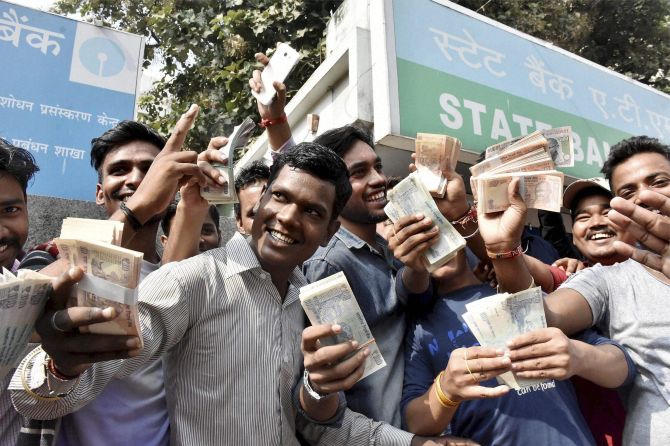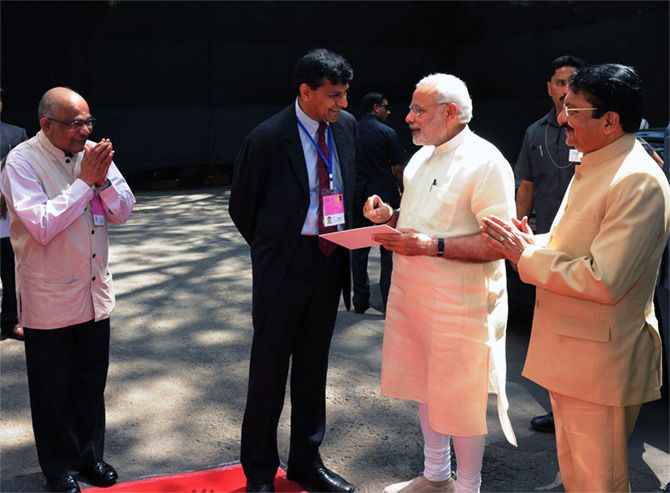 | « Back to article | Print this article |
'Normally, the system is geared towards counting notes -- it is equipped to do x amount of work and one day you are asking them to do 20 x.'
'The processes involved are very complex.'

The title of the latest book by former Reserve Bank of India governor Dr Yaga Venugopal Reddy -- Advice & Dissent -- is enough for any journalist to shoot topical questions at him.
However, Dr Reddy is cautious enough to not digress from the subject of the book. He tells Ishan Bakshi and Indivjal Dhasmana that he is not against constituting committees, but the moot point is whether the Monetary Policy Committee is good for India in the prevailing circumstances.
He also talks about inflation-targeting, the relationship between the RBI and the finance ministry, and non-performing assets.
Amid a heated debate over the relationship between the RBI and the finance ministry, how do you assess its evolution over the decades?
Globally, the concept of independence of central banks came around the 1970s. So, it's not as if it was embedded in the institutional arrangement.
In India, it was settled around 1963, when Jawaharlal) Nehru said the RBI was within the structures of the government.
It was only after the reforms of the 1990s that we carved out a position for the RBI, and even then it is dynamic.
Independence depends on two things -- the context and the nature of the central bank.
What do you mean by the nature of the central bank?
Generally, people equate a central bank with an exclusive monetary authority, whereas we are a more traditional, full service central bank.
Now that (model) is preferred. This is the wisdom of the global financial crisis.
Now, the direction is of accountability and a little more coordination.
In the context of monetary policy, the literature says coordination is better enabled by having a full service bank.
Once you have a full service bank, the nature of the relationship with the government depends on the nature of activities the RBI is doing.
If you are a banking regulator, the nature of the relationship is slightly different from being a monetary authority.
But, isn't this where contradictions between multiple objectives crop up?
The whole issue is whether independence of each of these functions is better for the system.
What did England do? First, they took away banking regulation. They have brought it back now. So, you do get some advantages from coordination.
When you are asking for independence, subconsciously you are assuming that the RBI is responsible especially for monetary policy.
Now let us say, they achieve the inflation target, but banking goes for a toss. Then?
The Reserve Bank and the Governor were earlier judged on several facets.
And the RBI board consisted people from different segments of society whereas the MPC represents economists dealing with the monetary policy.
However, the monetary policy is not merely a technical issue.
Are you saying that having multiple objectives is a better approach than adopting an inflation-targeting regime?
I'm saying if you have taken an approach, take it fully.
If you want it to be a monetary authority, then have it as a monetary authority. You should separate it out.
But you can't give the RBI all the functions. What is the priority?
If you ask me about the new arrangement of the monetary policy committee, it is consistent with global practices and theories. But, is it more appropriate for our circumstances?
That will require assessment of what we were before and now.
In principle, I'm in favour of the committee approach.
As the governor, I constituted the technical advisory committee on monetary policy.
I also self-imposed an inflation target.
The issue is whether it should have been a codified formal arrangement.
The government recently issued an ordinance to empower the RBI to take action on solving the NPA issue.
Do you think the RBI has the capability to appropriately assess or measure risk?
In principle, the way the Banking Regulation Act stands, it (the RBI) has all the powers.
I'm sure the government made an assessment about the capacity of the RBI.
Let me put it this way: You are trying to solve the NPA problem. It's on the banks books.
But what's the job of the bank management and the owner? It is to tackle the NPAs.
What's the job of the regulator? To say that you (banks) do it.
Now the owner is not doing its job. It is asking the regulator to do its job.
This is an extraordinary situation. It's an unconventional measure.
Recently, finance ministry officials asked members of the monetary policy committee to meet them before its bi-monthly review meeting. Do you think this was appropriate?
The finance ministry has many channels of communication. They have publicly expressed their opinion. They can also do it in writing.
There is no prohibition that they should not discuss these issues.
But people ask, 'Is there something else you want to discuss apart from this?'
Now, somebody can say there is nothing wrong in discussing. I think it's a perception issue.
It is perceived as interference. And that is important to the whole concept of inflation-targeting. Its credibility.
The RBI has still not come out with the final tally of how much cash was deposited in banks due to demonetisation.
Do you think the central bank should take so much time to put out the final number?
The processes involved are very complex.
Normally, the system is geared towards counting notes -- it is equipped to do x amount of work and one day you are asking them to do 20 x.
The challenge and magnitude is unprecedented.

Some say that you were very conservative in your approach during your tenure as RBI governor. Even after that, the pace of financial reforms has been slow.
I was conservative and stopped many things.
But after that what happened?
On all matters that I was conservative, they should have blossomed after I left. They should have happened.
But nine years (have passed since then).